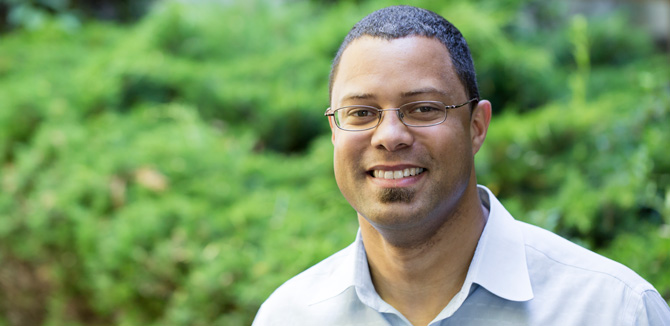An Unconventional Path
Alumnus Doug Williams leverages his leadership in business strategy as a consultant to technology and engineering startups
Doug Williams (’00) describes his career as more of a jagged roller coaster than a traditional arc.
After graduating from Northwestern Engineering with a bachelor’s degree in chemical engineering and later receiving an MBA from Stanford, he assumed roles within a variety of companies, from early-stage startups to established corporations, where he specialized in product development, operations, and engineering management. Despite the breadth of experience, he struggled to find companies who valued his diverse technical and strategic experiences and skillset.
Now an independent consultant based in San Mateo, California, Williams combines his leadership in business strategy with his expertise in biotechnology, alternative energy, and chemicals to help technology startups develop go-to-market strategies supporting their products and services. We asked him about the companies he works with, how his chemical engineering degree has helped him, and what advice he has for chemical engineering undergraduates as they prepare to embark on their own careers.
How would you describe your current role as a consultant? What types of companies do you work with?
I work mostly with technology and engineering startups to launch new products or services. I typically work with senior teams to develop go-to-market strategies for these new ventures. I also connect them with prospective customers from my contacts. In the past, I conducted techno-economic analyses for process-related startups to identify cost structures and opportunities to deploy the client's technologies in new ways.
You currently work with many companies that specialize in synthetic biology-related products. From your perspective, how has the field grown as an industry over the last few years?
Given the hype around the area, I'd argue that it hasn't lived up to its promise just yet. Though there are many new modern tools and techniques which are very cool, there isn't the type of insights, controls, and standardization that is needed for an industry to fulfill its promise. Even with drug applications, the entire development and commercialization processes are still mostly bespoke. Though we know many more things that can be done on the biology front — such as next-generation sequencing, gene mapping, and metabolic pathway mapping — those tools are only the first step to bringing real, transformational products to market.
There have been great advancements in robotics and high throughput applications, but the data analysis tools and best practices needed to make sense of the data these systems generate is lacking. Synthetic biology and technology in general are supposed to give better insights and control to engineer more precise products. We don’t yet have the industrial control we have with synthetic chemistry. Cheap oil has been available to us for 100 years, but manufacturing new biologics remains expensive.
Synthetic biology is exciting specifically because it is not fully developed. It’s worth spending a career working to achieve the level of maturity where we see the transformational products emerge.
How has your degree in chemical engineering, and your experience at Northwestern Engineering, helped you in your career?
What I learned at Northwestern is the lens through which I solve problems. What I've found is that there are people who do the homework and people who don't.
When I've done the homework, I've discovered when companies were lying about their S-1 filings or when business models have been flawed. I figured out that a company — a prospective partner — wasn't really serious about a line of business that we wanted to partner with them on right before they sold it off. This willingness to do the work is what sets Northwestern graduates apart from people who hide behind their institution's reputation.
Do you have any favorite memories during your time at Northwestern Engineering? Are there any particular experiences or connections that stand out?
My favorite memories at Northwestern Engineering were with the EXCEL Scholars program for incoming first-year students. I was the head counselor for that program for three summers and I taught the chemistry course the summer after graduation. In many ways, my work with that program has been my best work. We're in a time when the world is trying to again understand how to address racial diversity and inclusion. Northwestern has had a long-standing program that introduced Black, Latino, and Native American students into the Northwestern community and saw each student achieve the same success as the rest of the community. This success is rare among many institutions.
My involvement in the EXCEL program fundamentally changed my experiences at Northwestern for the better.
Do you have any advice for current chemical engineering students?
You need to know what you need to be happy. I am a strong proponent of the chemical engineering curriculum, but it’s not the easy way through college. You should only take the hard way to pursue the life you want for yourself. You need to have some self-awareness to make important life decisions. For example, it may be a challenge to live on Miami Beach if you want to work in agriculture. I encourage students to think of their 20s as an educational period to help make those decisions, whether that means getting additional degrees or taking job experiences based on their opportunity for learning.
There is also a dire lack of leadership in the world. Many of the challenges that I've experienced personally or have learned more broadly are due to a lack of institutional courage and leadership. Northwestern gave me a lot of opportunities to develop leadership skills that I think are invaluable. Northwestern should continue to invest in opportunities where students can develop these skills, and students should take advantage of them.

